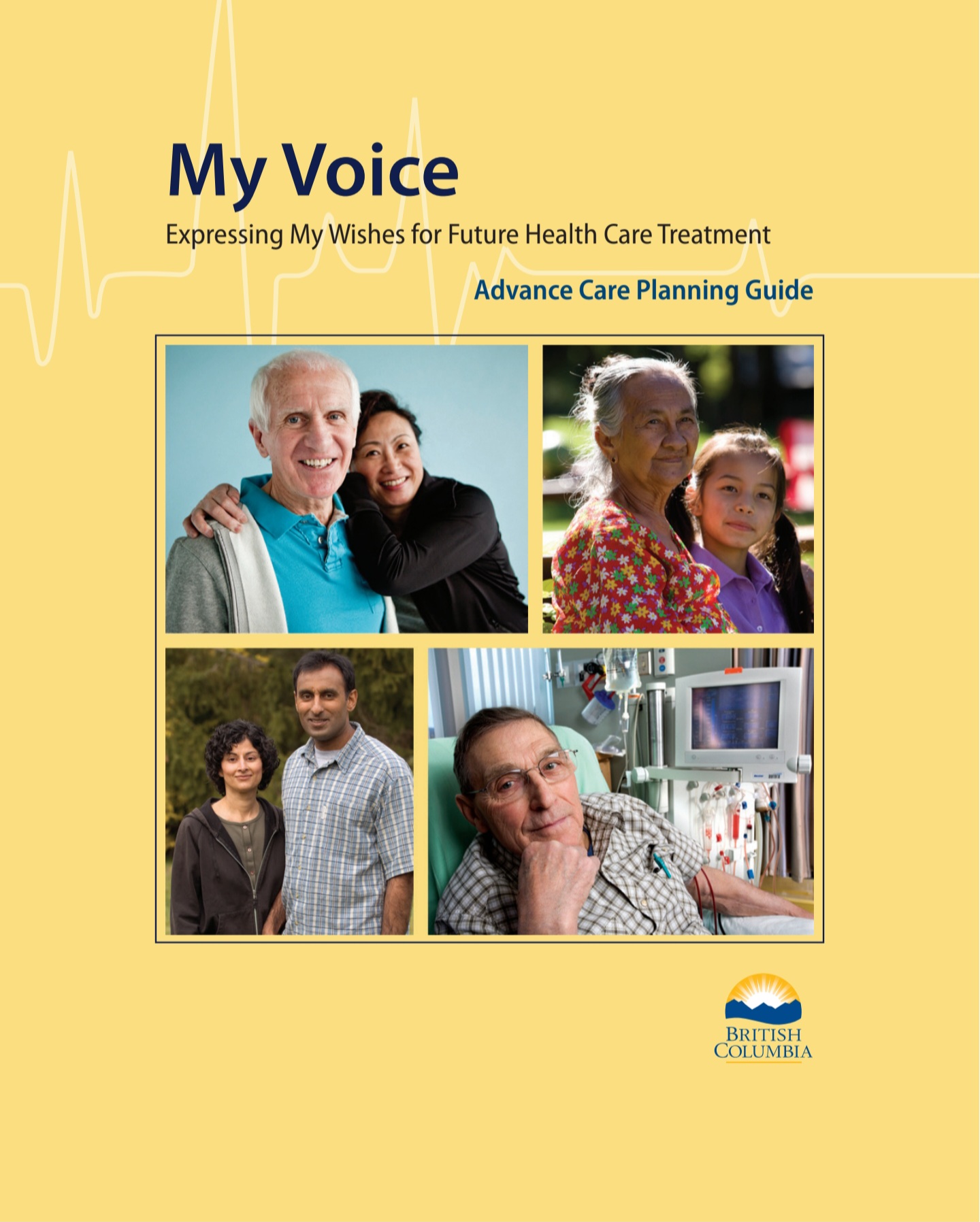Understanding My Prognosis

Coping with a prognosis can be challenging and overwhelming, especially if it is life-limiting. Consider learning about strategies to help you understand your prognosis, cope with your emotions, and give you clarity in making informed decisions.
Learning About Strategies to Help You Cope with Your Prognosis
- Learn as much as possible about your health condition.
- Ask your doctor questions to clarify your prognosis and treatment options.
- Keep updated about available treatments, clinical trials, or alternative therapies.
- Record your personal health information in your Health Profile. Keep all collected condition-specific and treatment information in your My Health Information digital and print files.
- Focus on short-term, achievable goals that contribute to your emotional wellness.
- Rely on family, friends, and your care partners for compassion and understanding. Be open about your fears, hopes, and wishes.
- Seek out support groups who understand your situation.
- Consider professional counselling or therapy for emotional support.
- Create routines that help you feel in control of your day-to-day life.
- Talk to those you trust about your wishes for health care decisions, being an organ donor, and your end-of-life care.
Tip
Prior to and at the end of your life can be the most difficult time to have your voice heard. By preparing and writing things down, family, friends and health care providers can work together to adhere to your wishes.
“As a leader in health care for the past 40 years, now retired, I have witnessed first-hand many changes for the better in service and patient care quality. As well, I have witnessed the shortfalls due to budget constraints and limited professional resources. I joined the Mywell Health community because I see the importance of offering people free access to information that helps them have a voice in their health care. It is difficult in a complex medical system to ensure care is client- or patient-centered. The responsibility should not rely solely on the health care providers – people need to be given the tools to advocate and partner in their health care decisions.”
My End-of-Life Wishes

Helping with End-of-Life Wishes
Discussing and Recording Your End-of-Life Wishes
- Find a safe space to discuss your end-of-life wishes with those you trust before you are very ill and unable to communicate or make clear decisions.
- Share your values, beliefs, and any concerns about end-of-life care, the dying process, death and after life preferences.
- Talk with your physician, nurse practitioner, specialist, palliative care and hospice care professionals to answer your questions and concerns.
- Think about and voice your choices around personal boundaries and privacy and confidentiality during your final days and after your death.
The following list of questions/tasks are offered to assist in your planning.
Who
- Is your temporary substitute decision-maker list up to date? Or, have you prepared a representation agreement that names your substitute decision-maker to make health care decisions on your behalf, if you are unable to do so?
- Have you discussed the visitors you want at your bedside in your final days? Do you have any specific instructions for them during this time?
- Do you have cultural spiritual advisors that you want to be called?
What
- What may make you comfortable (music, prayer, family, friends, traditions) in your final days?
- If choices are available, what medical interventions do you want or not want?
- Have you discussed a Do Not Resuscitate or No CPR order or Medical Orders for Scope of Treatment (MOST) with your physician or nurse practitioner?
- Are your wishes and preferences written in an advance care plan?
Where
- Where do you want to be at the end stage of your life (at home, in hospital, in palliative care or hospice care, or somewhere else)?
- Where do you want your celebration of life, funeral, or memorial to take place?
- Where do you want your remains to be laid?
How
- Have you discussed any cultural, spiritual, or religious traditions you want at the end of your life?
- Do you know about Medical Assistance in Dying (MAID)?
- If you choose MAID, are you interested in learning about bereavement support or support groups for loved ones?
- How do you want to be remembered? What are your wishes for your celebration of life, funeral, or memorial?
- Have you considered and/or are you registered to be an organ donor?
- Have you discussed how you would like your passing to be communicated to others (by phone, in print, and/or by social media)?
Tip
Find a safe and comfortable space to discuss your end-of-life wishes with those you trust before you are very ill and unable to communicate or make clear decisions.
Who Supports My End-of-Life Decisions

Identifying Who Supports Your End-of-Life Decisions
- Think about who you want to be involved at the end of your life and when, and how you want them to be involved.
- Reflect on those you trust and who are closest to you. Consider your care partners and how they have been involved.
- Confirm the people you have chosen to support your health and end-of-life decisions (both professional and personal).
- Keep in mind, though, that unforeseen factors may impact even the best-laid plans.
- Update your list of Health Care and Business Professionals in the fillable PDF tool found in My People.
- Add any new roles that are important to you with the person’s name, contact info, and any special instructions.
- Visit the resource kit to learn about these roles and services:
Temporary Substitute Decision-Maker
Palliative Care Professional
Hospice Care Professional
Power of Attorney (Enduring)
Lawyer
Tip
Consider seeking guidance from your health care professionals, palliative care or hospice care specialists and cultural spiritual advisors. Planning can provide peace of mind and ensure your wishes are heard.
“Dad’s old chair by the front window held countless memories of relaxing talks with him. It was where he cradled his grand-babies for the first time, regaled us with stories from his past, and imparted his tried and true advice. He had identified who was his power of attorney (enduring), executor, health advocate(s), and cultural spiritual advisor(s). We knew his wishes for his funeral and burial. However, there were certain conversations we did not have – discussions about the end of his life, his clear preferences for where he wanted to be, final medical interventions, and who he wanted to be surrounded by. Recognizing the importance of these discussions, the Mywell Health activities were developed to facilitate such conversations and to offer a way to record or write down the wishes of our loved ones.”
My Advance Care Plan & Decision Documents

Planning for the end of your life can be difficult. It is important to know that many health, government, and non-profit groups have written booklets and tools to guide you in discussing and making end-of-life decisions.
Completing Your End-of-Life Decisions Documents
Consider learning about an advance care plan, which outlines your choices for medical treatment and care in case you become unable to make decisions for yourself. The plan outline and questions are there to assist you with identifying, discussing, and recording the following topics:
- Your personal values and goals about quality of life, dignity, and comfort in case of serious illness or injury.
- Specific health care instructions about the types of medical treatments you want or do not want, such as life support, resuscitation, or organ donation.
- The appointment of a substitute decision-maker.
- Your wishes for end-of-life care, including hospice care, palliative care, MAID, or other.
You can learn about the following decisions documents and download their templates in the resource kit.
Do Not Resuscitate or No CPR order
Medical Orders for Scope of Treatment (MOST)
Medical Assistance in Dying (MAID) Request
Organ Donor Registration
Power of Attorney (Enduring)
Tip
Our goal in creating Mywell Health was to provide you with current information on topics that might be new to you, as well as, a way to gather and store that information in a single place – be it a print binder or digital files – you choose.
My Will and Final Requests

Choosing an Executor
Writing Your Will and Final Requests
Having a will and updating it regularly ensures your wishes are followed and may help prevent family conflicts. When writing your will with a lawyer or notary:
- Choose an executor who can carry out your wishes.
- Consider their skills, personality, and the time commitment involved. Learn about executor compensation. Understand the roles of an executor and power of attorney, even if it is the same person.
- Consult professionals to ensure your will is valid, complete, and up to date.
- To assist with content in your will, review the ‘After a Death’ checklist to include guidelines for those following your wishes after your death.
- To learn more about wills, visit the resource kit for resources and templates.
List of items to consider:
- Who has been involved in your will discussions?
- Is your will current, signed, and dated?
- Have you chosen an executor and notified others with their roles?
- Have you documented your end-of-life wishes?
- Have you outlined how to distribute your belongings?
- Have you listed the care of dependents or pets?
- How do you want family heirlooms, photos, and history handled?
- Have you set aside funds for your celebration of life or burial?
- Have you shared your financial situation with your executor or power of attorney?
- Do you have specific wishes for your celebration of life or burial, including cremation or burial, and a plot?
- Have you considered leaving letters, videos, or a memory book as a legacy?
- Have you planned your celebration of life details, such as location, music, and budget?
- How should the news of your passing be shared?
- Do you have thoughts for your obituary or memorial card?
Tip
To assist your executor and others who are following your wishes after your death, check out the ‘After a Death checklist’ created by the government of BC with more details in the resource kit.







